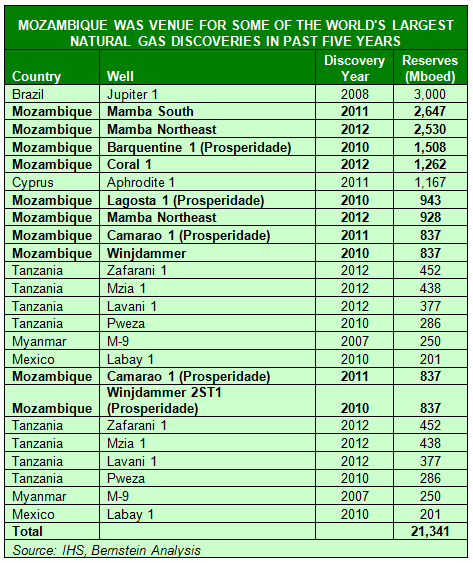"We estimate the gas discovered off Mozambique to date is worth USD 33 billion, around USD 2 per barrel of oil equivalent; i.e., economics are robust for a multi-train development [at around USD 1,500 per ton cost; or USD 8 per million cubic feet breakeven price/mcf breakeven price]," estimates Oswald Clint, senior analyst with Bernstein Research.
The country is unlikely to reach peak production till 2031 and compared to other global competitors, Mozambique costs are much lower, the Wall Street bank states.
Mozambique's average exploration sizes are seven times larger than in mature regions, and with vast tracts of Mozambique's 140,000-square-kilometer land largely unexplored, the potential of new discoveries are even greater. More than 110 trillion cubic feet of natural gas has been discovered offshore Mozambique, primarily by consortiums led by US-based Anadarko Petroleum in Rovuma Area 1 and Italian energy giant Eni in Rovuma Area 4.
"Given the close proximity of the Mozambique discoveries, the export project economics will be strongly dependent upon the clustering of development and the extent of cooperation between operators," said Ernst & Young in a report on the global LNG sector.
Hydrocarbon prospects lure oil giants
Anadarko and Eni agreed to a cooperative development program for their adjoining offshore areas and will, together, plan and construct a common onshore LNG liquefaction/export facility. The agreement should facilitate government approval of the developments.
Recently, Eni sold 28.75% stake in its East Africa operations to China National Offshore Corporation (CNOOC), which gives the Chinese company a 20% stake in Mozambique gas assets worth 75 trillion cubic feet of natural gas.
"Note that CNPC already have gas/LNG joint ventures in place with Shell in Australia, China and Canada and there may be some potential for coordination as Shell has also expressed interest in Mozambique while highlighting that it felt headline prices close to USD 3.00 were too high," said Richard Hutton, analyst at RBC Capital.
Shell has been scouting for Mozambique for some time, but has not been very successful. In 2012, Shell butted heads with Thailand's PTT Exploration and Production for an 8.5% interest in Anadarko's Rovuma Area 1 development in offshore Mozambique.
After multiple bids and counterbids, Shell withdrew from further bidding.
"However, Shell is expected to continue to explore other options in the East African gas plays, with Shell's deep experience in LNG development and marketing expected to be particularly attractive to potential partners," notes E&Y.
Not everyone agrees about the prospect of Mozambique gas.
French oil company Total S.p.A. said it is not active in mergers and acquisitions in Mozambique, with its chief financial officer stating that the country now has high cost of entry and high risks of delay and cost overrun.

Oil off Mozambique
With an embarrassment of natural gas riches already discovered off the Mozambique coast, energy companies are wondering whether there is any oil to be discovered as well.
Bernstein's Clint says there is a 60% chance of oil deposits off Mozambique.
"While it is a given that Mozambique's Rovuma basin holds a world-class gas province, the evidence also suggests potential for oil in the basin. However, the risks for oil are principally that: (a) explorers are aiming to identify an uncertain source rock in the oil window (b) at a location where there are also sufficiently developed overlying reservoirs and (c) some seismic sections suggest it is more difficult to close traps located further from the river mouth. Hence, we view the risk as high." Recent drilling programs suggest there is some oil. Eni is drilling for oil in an area, which may have as much as 250,000 barrels, while Tullow Plc is looking in an area with as much as 300,000 barrels.
"What is particularly notable about these blocks is their size: While the average block in the UK North Sea covers around 70 sq km, and the average block off of Norway is around 150 sq km, these Mozambique blocks are 50 to 400 times larger," said Clint. "Larger blocks mean greater resource potential and potentially give explorers more prospects to choose from, which can be a positive for frontier drilling."
It's early days yet, but if commercial quantities of oil is discovered off the coast of Mozambique, it will add to the supply glut in global energy markets, and no doubt raise the country's international profile even further. © alifarabia.com 2013





Sem comentários:
Enviar um comentário